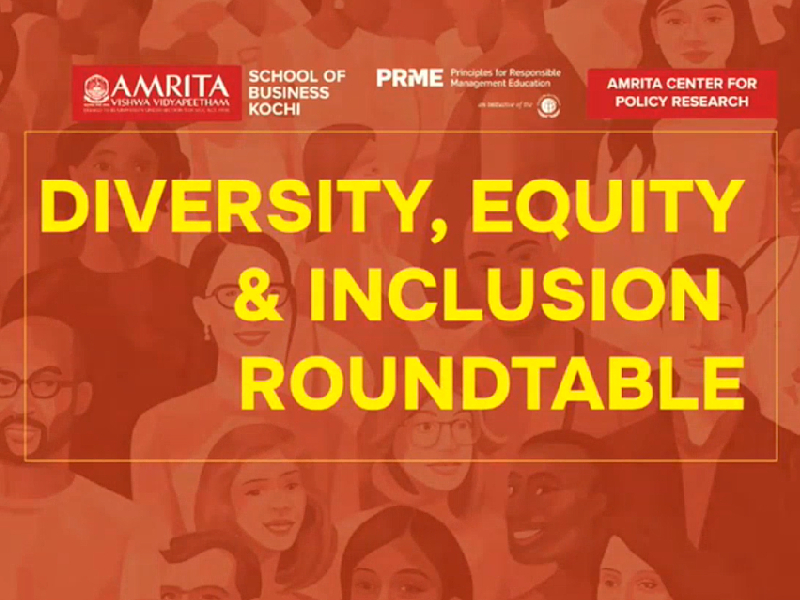Programs
- M. Tech. in Automotive Engineering -Postgraduate
- Master of Physician Associate (M.PA) – (Medicine, Surgery) 2 Year -Postgraduate

Amrita School of Business Kochi with Amrita Centre for Policy hosted a DEI Roundtable titled “From Intent to Impact: Designing a Future for All” on 10 October, 2025. The one-day event facilitated a dialogue with action from leaders shaping the future of diversity, equity, and inclusion. The event aligns with the UN SDGs 4, 5, 10, and 17—promoting quality education, gender equality, reduced inequalities, and strong partnerships for sustainable development.
The event featured an inspiring lineup of speakers, including Mr. G. Vijaya Raghavan, Hon. Director, CADRRE and Disability Inclusion Leader; Ms. Nitya S, Senior Lead, Trustin – Gender Policy, Partnerships & Programs; Mr. Subhanish Malhotra, Vice President–HR, Webpun World, specializing in Strategic HR and Talent Management; Mr. Robin Tommy, Inclusion and Tech Innovator, and Social Impact Leader; Ms. Anima Nair, Neurodiversity Head at Interweave and TEDx Speaker; Ms. Malvika Singh, Head of Campus Hiring, BNY Mellon; Dr. Prema Nedungadi, UNESCO Chairholder on Assistive Technologies in Education, Associate Dean, School of Computing, Amritapuri, and Director, Amrita CREATE; and Ms. Nandita Pradhan, Director, Martha Farrell Foundation.
Dr. Prema Nedungadi shared that each of the UNESCO Chairs–Gender Equality and Women’s Empowerment, Experimental Learning for Sustainable Innovation & Development, and Assistive Technologies in Education–at the University embodies the spirit of DEI addressing these values through distinct yet complementary dimensions. In her talk titled “AI-based Assistive Technologies for Persons with Disabilities,” Dr. Nedungadi shared the inspiring journey of foundational research and ongoing projects, highlighting key learnings and gaps in both technology and policy.
As the India Coordinator of the C20 Education and Digital Transformation (EDT) Working Group, she recounted the extensive deliberations and engagements with diverse stakeholders and Persons with Disabilities (PwDs) during the C20 process that underscored the need for focused research in Assistive Technology—ultimately leading to the establishment of Amrita’s third UNESCO Chair.
Dr. Nedungadi said, “We have on our team Deaf members, interpreters, and neurodivergent individuals—especially disability leaders—as part of the team right from the beginning. Their lived experience is invaluable, and all meaningful inputs must come from them for the project to succeed.” Looking back at the diverse projects undertaken over the years, she stressed on the collaborations with institutions working in these specific areas and experts from multiple disciplines to ensure that the solutions co-designed with the community are pivotal for success and adoption.
Another important aspect highlighted was the critical role collaboration plays in driving inclusive innovation. Through the OLabs initiative, Dr. Nedungadi’s team is collaborating with Deaf schools to study how science is taught by Deaf educators. Through the latest funded project, supported by the Ministry of Electronics and Information Technology, Government of India, to develop a platform that generates audio descriptions for videos for the blind and Indian Sign Language (ISL) avatars for the Deaf, the team is accessing the accuracy and effectiveness of avatars in depicting science experiments with feedback from Deaf science teachers. Simultaneously, meaningful collaboration with the government remains key to ensuring the initiative’s scalability and broader impact.
In response to a question about the challenges faced, Dr. Nedungadi shared a key takeaway from dyslexia research, which revealed stigma remains a major barrier, even among parents. She emphasized the need for greater awareness and understanding across the entire ecosystem—schools, families, and the broader community—so that children can be screened early, receive appropriate support, and have the opportunity to thrive. Similarly, to mainstream ISL an ISL learning platform has been created where anyone can learn the basics free of cost, which tackles both the knowledge gap and societal dimension.
Dr. Nedungadi reflected that when it comes to data, computing, and policies, the lack of data sets was the first challenge. For the Indian Sign Language (ISL) project, with no existing datasets necessitating the creation of a vocabulary of just 300 words collaborating with the Deaf community to produce nearly 80,000 videos to train the AI model. Another significant challenge lies in computing infrastructure. With funded projects research is advancing with dedicated infrastructure and teams. In terms of policy development, the lack of clear frameworks and roadmaps make navigating this space complex.
Overall, the roundtable and insights from the speakers offered practical insights on embedding inclusion and equity into everyday workplace practices, along with valuable networking opportunities with DEI leaders, innovators, and cross-sector peers. Participants gained actionable strategies to translate awareness into measurable workplace impact, supported by research-driven approaches and practical frameworks aimed at fostering societal change and long-term sustainability. The conveners of the event were Dr. Murale Venugopalan and Dr. Vandana Madhavan Pillai, Amrita School of Business.